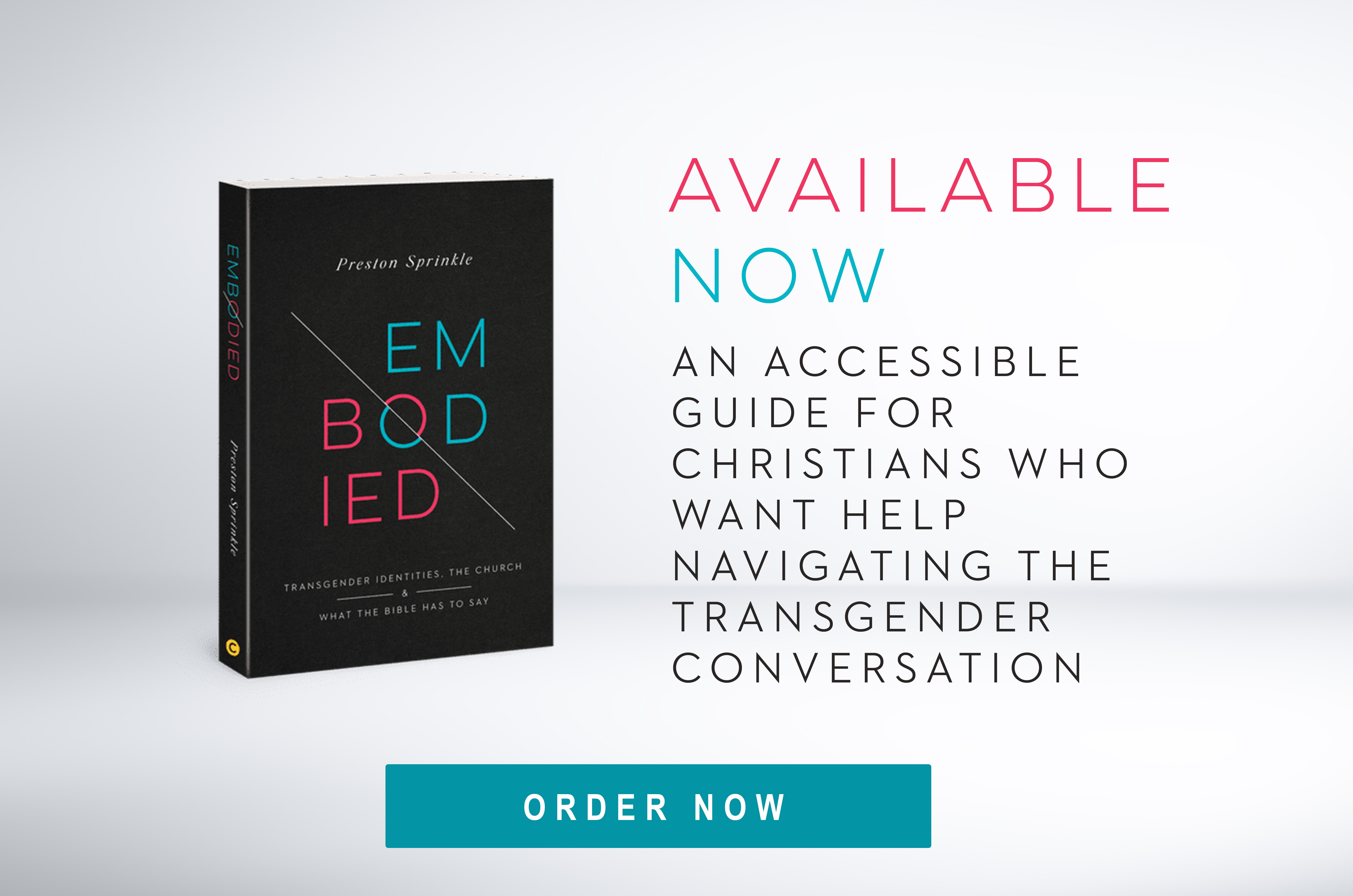
By Preston Sprinkle, President of the Center for Faith, Sexuality, and Gender
Understanding the importance of language is crucial in the LGBTQ conversation, and the transgender conversation in particular. I’m not just talking about the lexical definition of words. That’s certainly needed. But I’m talking about how words can give off a certain air, or tone, or convey hidden (usually unintended) assumptions. Practically, certain terms can create relational bridges, or they can build relational walls. As Christians who are commanded to “love your neighbor as yourself,” we should be particularly vigilant to build bridges with our words, especially in a conversation where language is a sensitive topic.
I want to say upfront that I’m on a journey and I learn new things almost every day about how certain terms and phrases are heard and felt by the very people we’re talking about. I don’t claim to have the perfect, LGBTQ friendly lexicon. And I’m not primarily interested in being politically correct or using terms and phrases that embody an unhelpful or incorrect ideology (which is why I don’t use the phrases “sex assigned at birth” or “gender confirmation surgery;” I’ll explain why in a later post).
But when a phrase or word is unnecessarily offensive, off-putting, triggering, or erects a relational wall between me and another image bearer, then I won’t use it, especially when there are other terms you can use in its place.
Buy Now!
Embodied: The Latest from Preston Sprinkle
This is why I don’t use the term transgenderism.
There’s nothing inherently wrong about the term itself. Transgenderism simply “refers to the broad spectrum of people who transiently or persistently identify with a gender different from their natal sex” (DSM 5). But terms can take on a life of their own, beyond their dictionary meaning, depending on the way society uses them. This is true of transgenderism.
Transgenderism has often been used in a way that’s impersonal, negative, and too sweeping. One of my trans* friends said: “Transgenderism is a nameless, faceless, personality-less enemy that’s easy to vilify.” It almost sounds like a disease, like something you might catch when your immune system is compromised. “Man, I came down with a bad case of transgenderism, but the doctor gave me some amoxicillin so I’m doing okay now.” That’s not what the word means, of course. But it’s certainly how it often feels when people use it.
Transgenderism is also the word of choice in the culture wars today. You have conservatism, liberalism, transgenderism, and all kinds of other -isms that are threatening your rights and waging war against your faith—so the narrative goes. But a 15-year-old suffering from severe Gender Dysphoria is not your enemy. Words like transgenderism might make for good ammunition when you’re going off to fight a culture war, but they’re often unhelpful for citizens of God’s kingdom who believe that the kindness of God leads to repentance (Rom. 2:4).
Using transgenderism can hinder relational opportunities. Sometimes, deliberately avoiding the term can open up some. I’ll never forget the time I was introduced before a college chapel talk last year. “Dr. Sprinkle will be speaking on the topic of transgenderism,” he very innocently said. (By the way, most Christians don’t realize that this term can be off-putting, so in no way do I want to shame well-intentioned people who innocently use it.) During my talk, I never used the term—I never do. But that night, I was meeting with an LGBTQ student group on campus and the very first question thrown at me was: “why did you use the term transgenderism?!” but another student quickly jumped in and said, “no, he actually didn’t, the guy who introduced him did.” And then several others chimed in to reconfirm that I hadn’t, in fact, used the term. Once it was agreed that I hadn’t actually used the term, I sensed a fresh interest among the students to engage with me in this topic.
The point: many LGBTQ people (especially younger people) are quite turned off when you use the term and they also notice when you don’t.
So what are some alternatives that you can use?
I typically use the phrase “transgender conversation” if I want to refer to the topic at hand. It’s non-combative, inviting, and includes both concepts and people. “Transgender people” is an obviously good phrase, yet sometimes it doesn’t fit the context (e.g. “I’m going to preach a sermon on transgender people this Sunday” feels a little odd and can actually come off as smug in a way that’s not indented). I sometimes use “trans* identities” or “transgender identities” if it fits the context. Tacking on the asterisk (*) to trans* is a simple way of including various other identities and experiences, such as transgender, nonbinary, genderfluid, genderqueer, and so on.
If I’m wanting to talk about some of the ideas promoted by some trans* people, I try to make it clear which people and which ideas I’m talking about. Or, I’ll salt my sentences with the word some as I just did. For instance, you probably shouldn’t say, “I disagree with transgender ideology,” since this is way too broad. Same goes for “I agree with transgender ideology.” You might disagree or agree with some or many aspects of this ideology, but probably not everything. I mean, part of this “ideology” is a deep concern for the high rates of suicide homelessness among trans*-identified people and the bullying that still happens on some school campuses. Hopefully every Christian (or human) should be concerned about this.
“Trans* ideology” is too broad for my taste. In its place, I might say something like “I’m critical of certain aspects of an ideology being promoted by some trans* activists.” (And again, I want to turn around and highlight some positive aspects in this ideology that I resonate with, or be willing to critique some of the sloppy critiques.) Better yet, just name the specific claim you find problematic and graciously explain why. In my experience, trans* people are very happy to acknowledge that such activists don’t speak on behalf of the entire community. Qualifications like “certain aspects” and “some trans* activists” clarifies this distinction.
Again, as I noted in passing, there’s no shame in innocently using a word or term that’s not the most helpful. We’re all on a journey and if you’re trying to humanize the conversation, then keep it up! And at the end of the day, if you’re unsure about a certain word or phrase, just ask trans* people how they feel about the words you’re using. This kind of humility can help humanize a group of people who often feel dehumanized by the church’s rhetoric.

